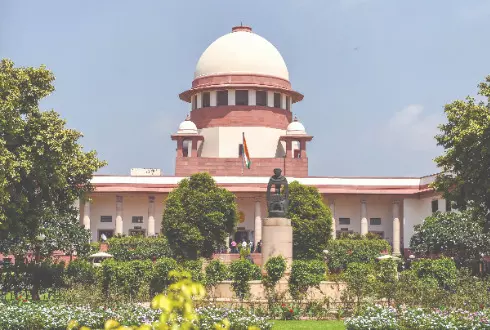
New Delhi, Aug. 20 -- The Supreme Court on Wednesday raised serious concerns over the possibility of Governors permanently withholding assent to state Bills, observing that such a power could leave elected governments vulnerable to the discretion of unelected officials.
A Constitution Bench comprising Chief Justice of India (CJI) B R Gavai and Justices Surya Kant, Vikram Nath, P S Narasimha, and Atul S Chandurkar was hearing a presidential reference under Article 143 of the Constitution. The reference, sent by President Droupadi Murmu in May, sought the court's opinion on whether constitutional authorities like the President and Governors could be bound by judicially prescribed timelines when deciding on Bills.
The matter arose after the Supreme Court's April 8 ruling, which had for the first time laid down a three-month time frame for the President to act on Bills reserved for her consideration.
During the proceedings, the Bench repeatedly questioned the Centre's position that Governors could indefinitely withhold assent to Bills even after they were re-passed by the state Assembly.
"If Governors are allowed to simply withhold assent without returning the Bill for reconsideration, governments with a majority mandate would be left at the whims and fancies of an unelected appointee," the bench remarked.
CJI Gavai explained the four options under Article 200, "Governor may assent to a Bill, withhold assent, reserve it for the President, or return it to the Assembly for reconsideration. Once the Assembly re-passes the Bill and presents it again, the Governor cannot withhold assent or send it to the President a second time."
The court said allowing the option of "indefinite withholding" would undermine the elected legislature's authority.
Solicitor General Tushar Mehta, representing the Union government, argued that the Governor's role under the Constitution was not ornamental and that the office carried discretionary powers. He cited Constituent Assembly debates to highlight how the framers envisioned Governors as important links between the Centre and the states.
"Governor represents the Union in the constitutional scheme. He cannot be reduced to an office of a postman who simply forwards Bills without discretion," Mehta said, adding that the power to withhold assent must remain available for extraordinary situations.
He also pointed out that no time limit was prescribed under Article 200 for the Governor to exercise the first three options-assent, withhold, or reserve for the President's consideration.
Justice Narasimha countered the Centre's stance, warning that interpreting "withholding" as an absolute veto could erode constitutional balance. "There could be cases where the Governor initially withholds assent, returns the Bill with suggested changes, and later decides to assent after amendments are made. The interpretation cannot be straitjacketed. The Constitution is a living document, and its meaning cannot remain static," he observed.
The CJI questioned whether the expectations of the Constitution's framers regarding harmony between the Governor and state governments had been fulfilled. "You are entitled to read the debates, but see whether the expectations they had were met or not," CJI Gavai told Mehta.
The Bench also remarked that the court had witnessed instances where Governors had exercised discretionary powers in ways that triggered prolonged political disputes.
Responding to the Bench's concerns, Mehta urged the court not to interpret constitutional provisions based on isolated controversies. "One cannot interpret the Constitution on the basis of worst examples," he said.
He stressed that Governors' powers were designed with checks and balances in mind and should be preserved to safeguard extraordinary circumstances.
Senior advocate Kapil Sibal, appearing for one of the parties, rejected the Centre's submissions. He argued that by the same logic, the President could indefinitely withhold assent to Bills passed by Parliament under Article 111.
"That would make legislative processes meaningless," Sibal said.
The CJI clarified that the court was not delving into political contexts but strictly interpreting constitutional provisions. "There is always a presumption that high constitutional authorities exercise their powers in a bona fide manner. But our task is to interpret the Constitution as it is meant to be, independent of political scenarios," he said.
The court's observations come against the backdrop of frequent confrontations between Governors and state governments, particularly in opposition-ruled states. Questions over delays or refusal to act on Assembly Bills have often led to litigation, with state governments accusing Governors of overstepping constitutional boundaries.
Earlier in the day, the Bench asked whether India had truly lived up to the framers' vision of cooperation between Governors and state governments. Mehta responded that despite criticisms, the post of Governor was not a sinecure for political retirees but a constitutional office vested with powers and responsibilities.
In May, President Murmu invoked Article 143(1) to seek clarity from the Supreme Court on whether judicial directions could impose binding timelines on the President or Governors when dealing with state Bills. The referral followed the April ruling prescribing a three-month limit for the President to act on Bills reserved by Governors.
The hearing remains underway, with the court set to clarify the scope of Governors' powers under Article 200. The decision is expected to have lasting implications on Centre-state relations, particularly in defining the balance between elected state legislatures and gubernatorial discretion. As the CJI summed up during the proceedings, "We will interpret the Constitution the way it has to be interpreted-keeping in mind both its text and the living reality of governance."with agency inputs
Published by HT Digital Content Services with permission from Millennium Post.
